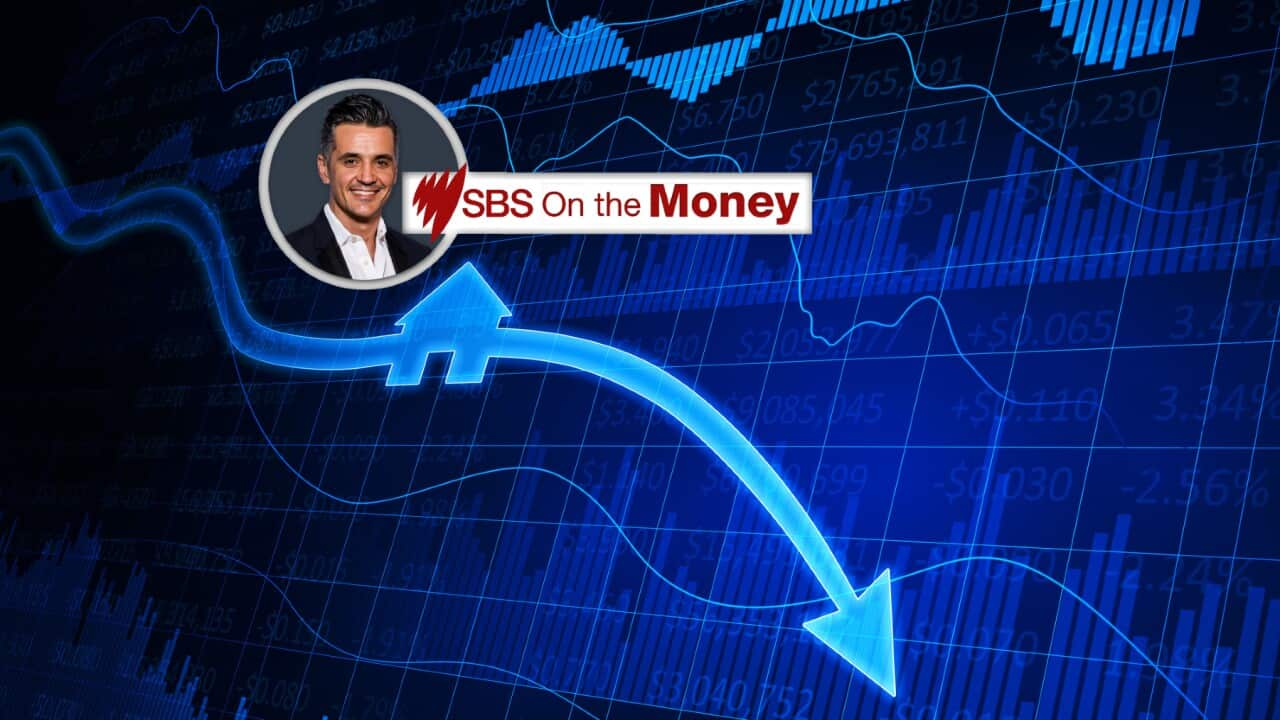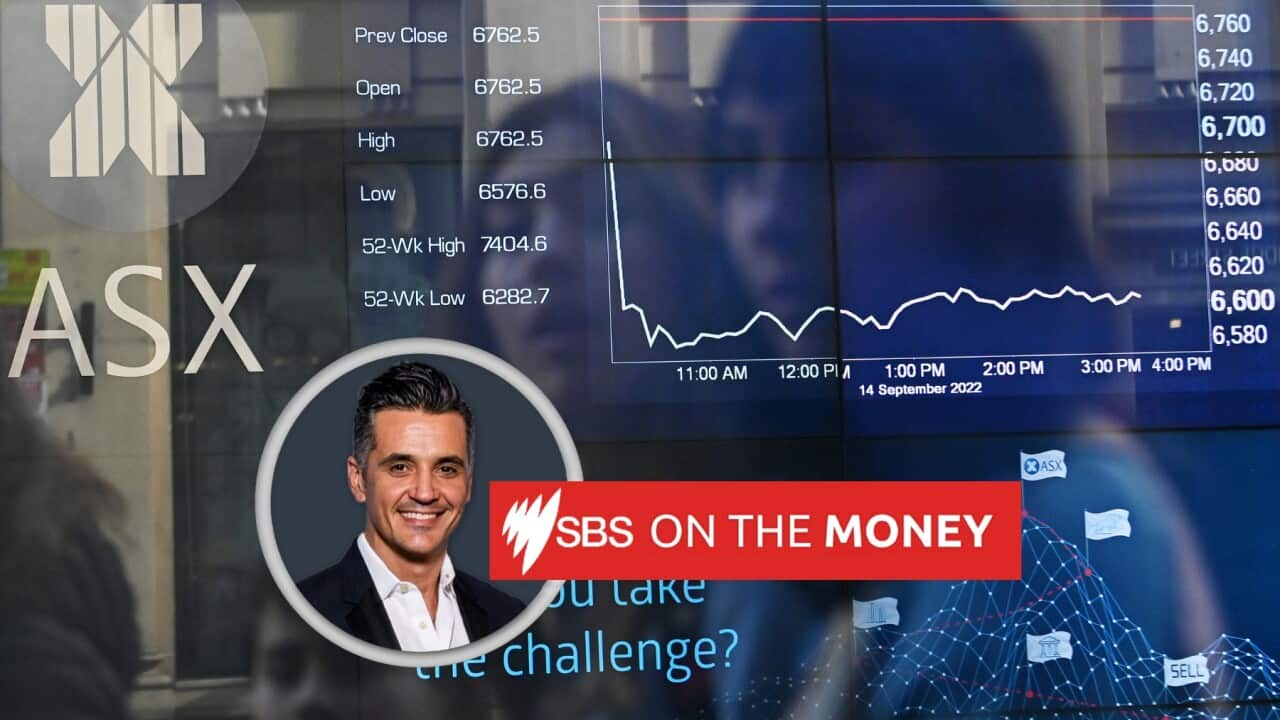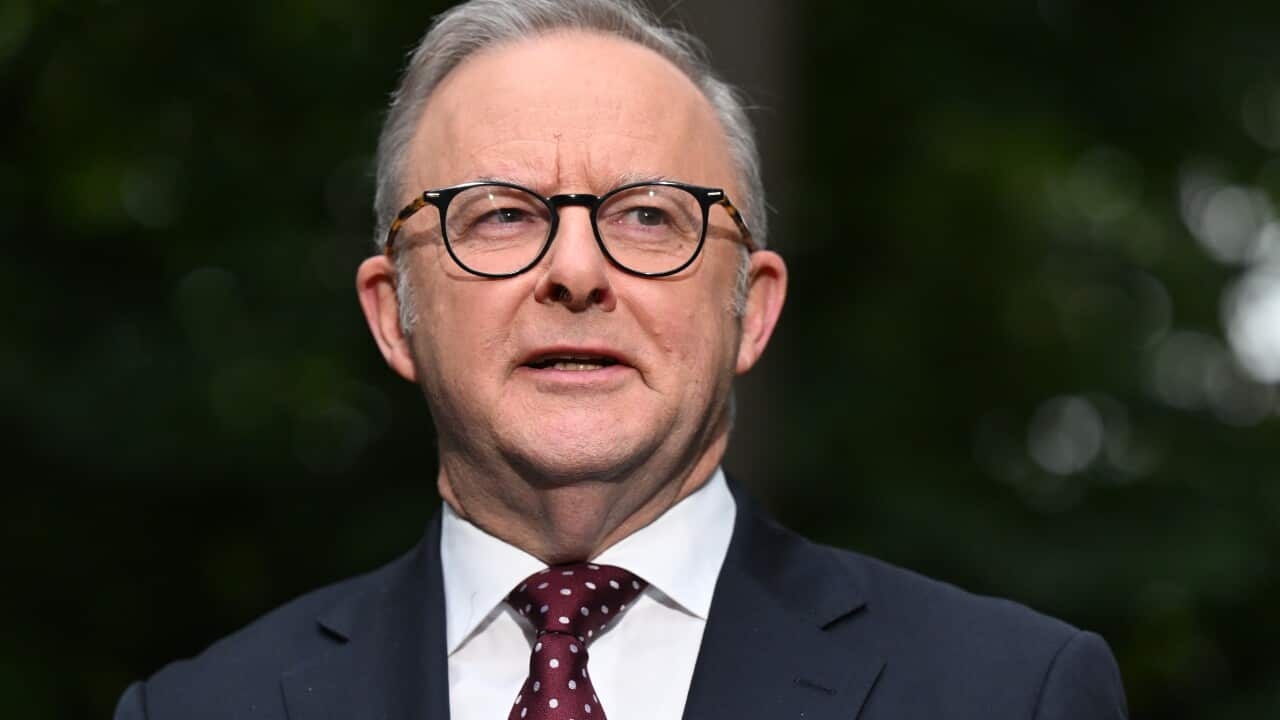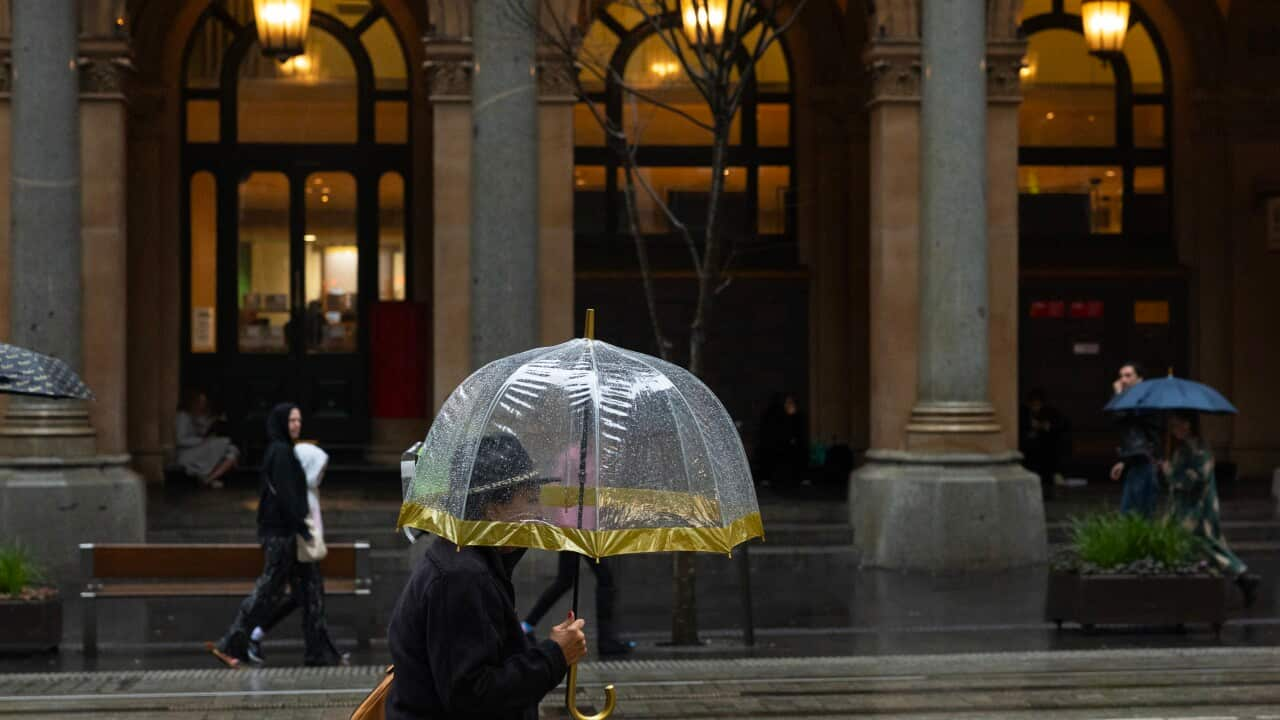Listen to Australian and world news, and follow trending topics with SBS News Podcasts.
US delays interest rate cut & copper prices crash

Australians owe trillions in their mortgages Source: SBS News
SBS Finance Editor Ricardo Gonçalves takes a look at whythe US Federal Reserve left official interest rates on hold with Brendan Rynne from KPMG along with fresh data showing Australians splurged at the end of financial year sales. Plus Elizabeth Tian from Citi goes through the day's market action including the crash in the copper price.
Speaker 1
You're listening to SBS on the Money with Ricardo Gonzalves.
Ricardo Gonçalves
Hi everyone, welcome to the SBS on the Money podcast for this Thursday, the 31st of July 2025. It's a day where the Australian share market fell, but only slightly by 0.2% on the S&P ASX 200. I'll have the details with Elizabeth Tan from Citi, including what she's also telling her clients. But first, a lot of economic news to get through, including how,
Ricardo Gonçalves
Shoppers are being attracted to the end of financial year sales in Australia, but the really big one overnight was the US Federal Reserve going against Donald Trump's wishes by holding official interest rates instead of cutting them for the fifth consecutive meeting at 4.25% to 4.5%. For more on that, I spoke with Brendan Rynne, he's the chief economist at KPMG.
Ricardo Gonçalves
Brendan, a lot to talk on the economic side of things today. Let's start with the US Federal Reserve, leaving interest rates on hold. Can you run us through why are they worried about tariffs and what does it mean for future rate moves there?
Brendan Rynne from KPMG
I think they are concerned about tariffs, however, most of the commentary from the US Fed chairman has been about employment. What you've seen is that they've got a very strong labour market still within the United States. They've only got an unemployment rate of about 4.1%, it fell from 4.2%, but in fact the market was expecting unemployment to rise to 4.3%.
Brendan Rynne from KPMG
So, the US Federal Reserve is now just a little bit unsure about how strong the local economy is. You've also seen inflation rise in the last month as well, so headline inflation has gone up.
Brendan Rynne from KPMG
From 2.4% to 2.7%. Now the likelihood is that tariffs are going to keep pushing that inflation up higher, which is concerning, the Federal Reserve about whether they should be continuing to ease interest rates further.
Ricardo Gonçalves
What about locally here, inflation data came out yesterday. It showed that inflation here is continuing to ease. We heard from the RBA deputy governor Andrew Hauser, he spoke early this morning too. Any indication about how the board is feeling about where interest rates are going because it left interest rates unexpectedly on hold for, you know, most people are expecting a cut, but they didn't cut earlier this month.
Brendan Rynne from KPMG
Oh, that's right. Well, interestingly, Deputy Governor Houser actually had a presentation today, and spoke about the fact that there is some uncertainty within the RBA board about the momentum within the Australian economy. He in fact quoted on saying on balance we're going to continue to hope and pray and forecast that consumption growth will pick up. That's a little concerning.
Brendan Rynne from KPMG
That, that's the perspective from the Reserve Bank. The reality is that the private side of the Australian economy is still very weak. Most economists, me included, anticipated the Reserve Bank was going to cut rates at the last meeting, not only because we were seeing inflation continuing to trend down, but the expectation that the labour market was going to soften.
Brendan Rynne from KPMG
As government related employment starts to weaken, the private side of the economy is very weak, and what we do need is more stimulus within the economy, and how that's going to happen is by reducing interest rates.
Ricardo Gonçalves
Speaking of consumption, one part of that story I guess is retailing and retail sales, a deluge of economic data coming out today, including retail, surging in June, I think by 1.2%. What do you make of it? And I know you're not, you know, you're at KPMG, but I saw an interesting note from the team at.
Ricardo Gonçalves
CBA, saying that the release of the Nintendo Switch 2 compounded the strength of the sales events because of all this, heavy discounting and end of financial year sales, what's your take on the retailing space, these numbers and what it says about the consumer?
Brendan Rynne from KPMG
And, and so while I didn't read the CBA statement, we also included commentary about the Nintendo Switch as well. But really at the end of the day, what you're seeing is that households are still being incredibly price conscious, and so lots of the growth that we've seen in the June retail sales is actually coming from end of financial year sales events.
Brendan Rynne from KPMG
So what you also, if you think about what we saw in the March quarter national accounts, you saw the savings rate increase. So household disposable income increased in the first quarter of this year, combination of both tax savings and also a reduction in interest rate spending. But households haven't immediately gone out and spent that.
Brendan Rynne from KPMG
They've saved them, and what they're doing is they're waiting for those sales events to happen during the year, so that they get their biggest bang for their buck because that is so precious now, and so that's effectively what you saw in June.
Brendan Rynne from KPMG
So things like the Black Friday sales and the in November, the Boxing Day sales and the end of financial year sales are now becoming marking events in the households so that they can actually be very careful with their spending and just buy what they need, at a lower price rather than what they want through the year.
Ricardo Gonçalves
And interestingly, this is the last time the ABS is releasing this retail sales data, it's changing to a different series. Can you tell me more about that?
Brendan Rynne from KPMG
So we've now got the household consumption series that's coming out from the ABX, and largely it's very similar, although what you're seeing is that some definitional differences in terms of how they split that data up. I suppose the one key difference that's important, I think more so for retailers is.
Brendan Rynne from KPMG
That you're now not going to get volume data on a monthly basis coming from the ABS. You're going to get it on a quarterly basis, but not on a monthly basis. Now, for many retailers, that volume data is helpful because it benchmarks their business against the broader retail community, but also it helps.
Brendan Rynne from KPMG
Helps them enable their forecasting, and cash flow profiling through the year in terms of how they expect their revenue to fall in different months. So, yeah, no, a sad day for statistical boffins like me, but nonetheless, we still know that we're going to be serviced pretty well by the ABS new series.
Ricardo Gonçalves
That's Brendan Rynn there from KPMG.
Ricardo Gonçalves
Now, market day on the SBS on the Money podcast.
Ricardo Gonçalves
OK, let's take a closer look at the Australian share market now with the S&P/ASX 200 fell 0.16% to 8,742.
Ricardo Gonçalves
That's despite 9 of the 11 sectors on the index ending higher. The IT sector performing best. It followed some great results from the likes of Microsoft and Facebook owner Meta in the US overnight. Consumer discretionary stocks also rose, but the reason why the index fell was a 2.6% fall in the material sector. So to tell us more about that and the day's market action, I spoke with Elizabeth Tien from City.
Ricardo Gonçalves
Liz, let's start with copper prices. They saw their sharpest drop since 1988, I think around 20% overnight, following more US tariff announcements. What can you tell me about that and the way these tariffs continue to influence investors and the way the market moves?
Elizabeth Tian from Citi
Well that really is, I guess, the big issue, right? These announcements are coming out, they're coming out at any point in time, no one quite expected that announcement last night. And it also, it's coming out in ad hoc, things are changing around, you know, when it first came out that, you know, we were going to have these tariffs on copper, it was.
Elizabeth Tian from Citi
That the raw material was going to face the tariffs, now it's not, and that's why we're seeing these very big swings in the market with these announcements. Obviously some of the miners locally on our markets off today and sold off, partly on the back of that news and obviously partly we've seen some downgrades in the sector including and also Rio.
Elizabeth Tian from Citi
Are coming out with a little bit underwhelming reporting, overall though, you know, it's August 1st tomorrow. We've still got a lot of, you know, countries that haven't been announced, including ourselves, Australia, so we're still waiting for that, there's still the risk of that. What's Australia going to face, what's the tariffs gonna look like, which sectors are gonna be impacted.
Ricardo Gonçalves
What extent do you think the tariffs are also affecting the way central banks around the world make decisions, because both the US Fed and Canadian central banks held official interest rates overnight, and what does this mean for investors?
Elizabeth Tian from Citi
Well, you know, you've heard it many times before, Ricardo. The markets don't like uncertainty, and there's obviously a lot of uncertainty with these tariffs, and, you know, you can't blame the Fed for kind of wanting to wait and see, you know, is it going to be inflationary, is it gonna be white off. We're already seeing signs that some of the inflation is coming through in the US. How much.
Elizabeth Tian from Citi
Is it going to slow growth? Who's going to eat it up? Is it the consumers? Is it corporates? Is it the exporters? Is it a mixture of all three? No one quite knows. The expectation though really is the inflationary impacts are really not going to be seen until perhaps later in the year. I mean, we know that none of these tariffs.
Elizabeth Tian from Citi
Are really finalised and the full impact hasn't flowed through. So central banks, the Feds, really sitting there kind of waiting. They don't want to, you know, make any false moves and cut and then have to see that, oh, maybe later down the year there are inflationary pressures that they didn't anticipate and have to hike back. So it's a little bit of wait and see, especially from the US Fed.
Ricardo Gonçalves
Still, what's your take on the US economy, because data overnight show that GDP is growing at an annualised rate of about 3%, and then you've got the likes of Microsoft and Meta posting overnight relatively solid earnings after the markets close there.
Elizabeth Tian from Citi
Well, yes, the 3% GDP, there was a little bit of noise, a lot of noise around that, Ricardo, there was a lot of front loading, you know, people, corporations, anticipating early in the year that these tariffs were coming, they were buying up inventory, and we've seen since then a drawdown in things like inventory, some of the corporations, you know, were still able to operate kind of in the pre-tariff inventory mode. So that gave a lift to the GDP.
Elizabeth Tian from Citi
Data, and yes, we saw some very strong numbers aftermarket come out of Meta, Microsoft, we're seeing the futures market in the US very strong, from this morning's session right throughout today, anticipating, the US market's going to open stronger tonight, once again coming from the tech sector. Once again, you know, it's really a story of we've got the tech sector doing really well, we've got.
Elizabeth Tian from Citi
You know, US reporting season so far, you know, are quite strong, really. The corporations are, you know, there's more beats than misses, the whole AI story, there's a lot of money still chasing the market, and but at the back of the mind, of investors' mind is, you know, do we see later on in the year, these tariff impacts come through and obviously, any slowdown in the US which we're starting to see signs of.
Ricardo Gonçalves
What about Australian reporting season, it's coming up. What are you looking out for? Because during confession season, I mean, it's continuing because we saw Seti, the online luxury brand, tumbling today because of tariff implications. Flight Centre issued a guidance warning today because of difficult trading conditions in the US also.
Elizabeth Tian from Citi
Yes, absolutely. So, Trump also announced the, the rule where basically it's under $800 US dollars, you're gonna be hit with tariffs. So big global players like Tu Shine, they're gonna be impacted and locally set higher, which does a lot of luxury, you know, loads, etc. reporting season.
Elizabeth Tian from Citi
You know, very much, you know, we saw retail sales data come out. We still think the sector's done quite well. Obviously, from the discounting earlier, we think that the discretionary sector has held up really well, so we think that's going to be, you know, we've got buyers on some of the names in that sector. The banking sector, you know, as usual, we
Elizabeth Tian from Citi
We are seeing some fairly hefty valuations. Commonwealth Bank will be the big one. We think there could be some anaemic growth in that sector, so it's very much a little bit of a weight and trying to get more colour, especially from the big players.
Ricardo Gonçalves
And finally, what are you telling your clients at the moment then and where do you see the opportunities for investors?
Elizabeth Tian from Citi
Yeah, it's been, obviously, you've been talking about tariffs, Ricardo, and it's been quite surprising how strong markets are. I think that's surprised everyone, since April, and we've seen a lot of investors pile back in since the April lows. A lot of that was coming from retail money, and the real question now is, you know, are valuations starting to get in that lofty stage, do investors, you know, have to really kind of sit back.
Elizabeth Tian from Citi
Obviously reporting season's gonna give us more colour around that, and very much it is, as I mentioned really, is it the AI story, and then, on one hand, and then on the other hand, the driver of these tariffs, which we really haven't seen the impact of, inflation, the slowdown, seeing weakening jobs, in the US. So obviously we saw it locally here down in Australia as well. So it's a bit bifurcated at the moment.
Ricardo Gonçalves
Elizabeth Tan there from City, that wraps the podcast for this Thursday. Don't forget if you enjoy it, to give it a rating and a review on Spotify and Apple Podcasts, and to click that subscribe button. We'll see you tomorrow.
Ricardo Gonçalves
This SBS on the money stream is provided for informational purposes only. The content in this stream should not be understood as constituting advice or a recommendation. It is not personal advice, and it does not consider your personal circumstances or objectives. You should contact a licenced professional before making any financial decision.
Latest podcast episodes
Recommended for you

superannuation funds











